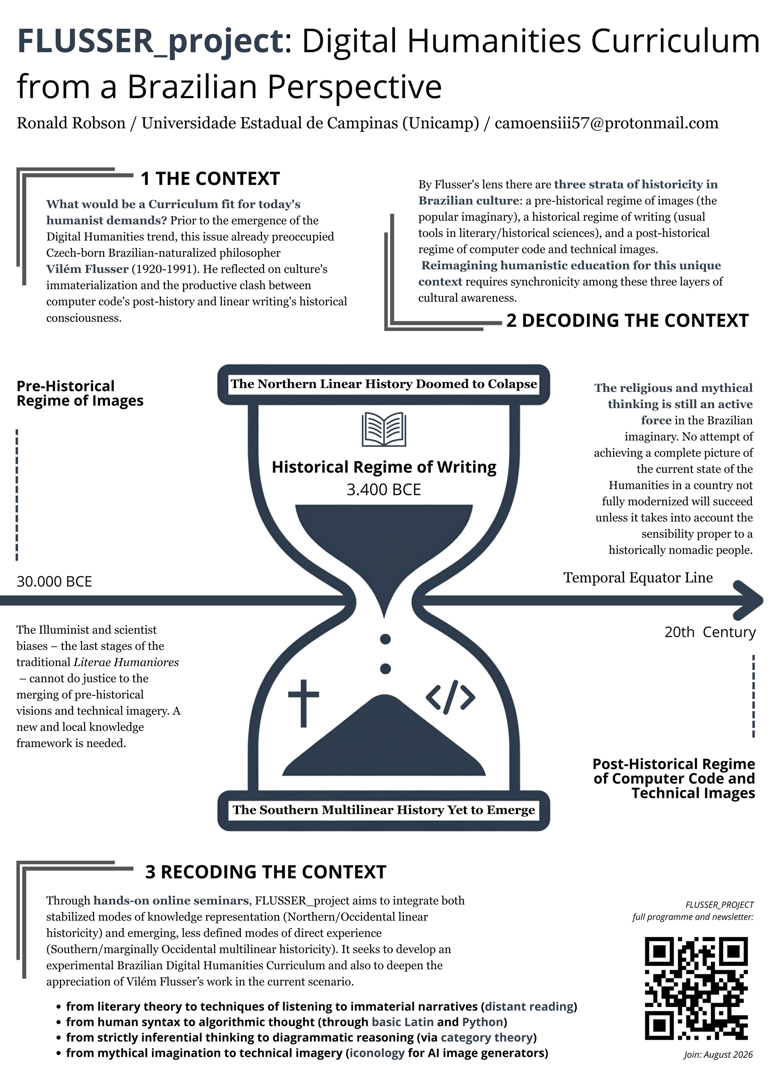
You know it's time to rethink Humanities curriculum (but Vilém Flusser already knew it)
FLUSSER_project: Humanities from a Brazilian Perspective
One of the biggest challenges in Digital Humanities lies in moving from theoretical reflection on the new circumstances of study in the 21st century to the effective research practices to which new humanists are dedicated (e.g., “distant reading” in literary studies, or “data visualization” in archival science). This issue, in fact, already preoccupied Czech-born, Brazilian-naturalized philosopher Vilém Flusser (1920-1991), a forerunner in reflecting on the immaterialization of culture and the productive clash between computer code's post-history and linear writing's historical consciousness.
What would Flusser consider a fitting curriculum for a digital humanist today? How would he approach transmitting the required knowledge and skills? FLUSSER_project aims to answer these questions, dialoguing with the Brazilian intellectual landscape Flusser so often engaged with.
The intellectual landscape in Brazil, in fact, is an even more delicate issue when it comes to establishing a curriculum. Through Flusser's lens, there are three strata of historicity in Brazilian culture: a pre-historical regime of images (the popular imaginary), a historical regime of writing (usual tools in literary / historical sciences), and a post-historical regime of computer code and technical images. Reimagining humanistic education for the digital age in such a unique context calls for a synchronicity between these three layers of cultural awareness, which would by necessity encompass an abstract and collective mode of knowledge representation (Northern or Occidental linear historicity) and a not yet perfectly defined mode of direct experience (Southern or marginally Occidental multilinear historicity).
Inspired by the philosopher's writings, FLUSSER_project will conduct an online seminar on Flusser's work and humanistic training: through a hands-on approach, ranging from basics of Latin syntax to Python programming, and from sociological methods to network theory, FLUSSER_project hopes to foster the dissemination of Digital Humanities among the Brazilian academic and non-academic public and to deepen the appreciation of the importance of Flusser’s philosophy in the present scenario.
FLUSSER_project will be launched in August 2026.
The Brazilian situation is extraordinarily instructive for Europeans. The European situation presents us with layers stacked on top of each other; but the Brazilian situation presents the same layers resting side by side: the layer of magic and myth, the layer of historical consciousness and action, and the layer of programmatic and systems-analytical thought and behavior. Consequently, the Brazilian situation enlightens the European about European history (…).
Vilém Flusser, “Mythical, Historical, and Posthistorical Existence” (1981)
"
FLUSSER_project at Digital Humanities at Oxford Summer School 2025
Ronald Robson, PhD in literary theory (University of Campinas) and creator of FLUSSER_project, was selected by Gale and awarded a bursary to attend the Digital Humanities at Oxford Summer School 2025 (DHOxSS).
In addition to participating in the workshop strand From Text to Tech, he will have the opportunity to share the core ideas of FLUSSER_project in a poster session to be held on 4 August at the Weston Library.
Subscribe to our newsletter (see the bottom of this page) to receive updates on DHOxSS 2025 and the key insights derived from it.
You can view the poster in higher quality by clicking here.


Writing is a step away from images, because it allows images to dissolve into concepts. With this step, the "belief in images," that is, magic, became lost, and a new level of consciousness was reached that led much later to science and technology. The techno-codes are a further step away from texts, because they allow us to make images out of concepts. A photograph is not the image of the facts at hand, as was the case with the traditional image, but rather the image of a series of concepts, which the photographer has come up with in the scene that signifies the facts at hand. Not only can the camera not exist without texts (for example, chemical formulas), but also the photographer must first imagine, then understand, to be able to "techno-imagine." With this step backwards out of the text and into the techno-image, a new degree of alienation has been reached: the belief in texts" — in explanations, in theories, in ideologies- is lost, because texts are now recognized as "mediations," just as images were once upon a time.
Vilém Flusser, “The Codified World” (1978)
"
FLUSSER_project newsletter is coming.
Subscribe now to get a first look at our upcoming program and learn how you can contribute.
Be in touch: camoensiii57@protonmail.com
